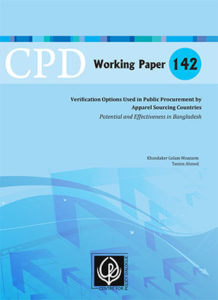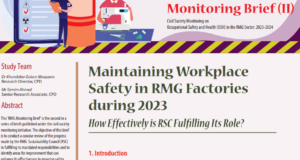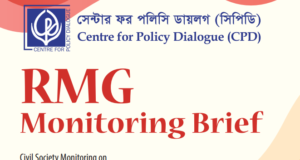Verification Options Used in Public Procurement by Apparel Sourcing Countries
Potential and Effectiveness in Bangladesh
Authors: Khondaker Golam Moazzem and Tamim Ahmed
 The objective of the study is to review the existing practices of different standards and certificates related to socially responsible public procurement (SRPP), and their potential and effectiveness in improving workers’ well-being, along with employment and workplace safety and workers’ rights in Bangladesh. An evidence-based approach, based on both primary and secondary data, has been followed in conducting the study. The study identifies a number of gaps in the process and maintenance of certification and standards that include submission of false documents in getting certified, lack of traceability of the supply chain, inadequate disclosure of information, lack of accountability of audit firms and suppliers and ineffective measurement approach. Despite having gaps, the certification process has contributed to improving the labour standards in Bangladeshi readymade garment (RMG) factories to different extents. Human rights in the RMG industries of Bangladesh will be significantly determined by the transparency and effectiveness of the certification process.
The objective of the study is to review the existing practices of different standards and certificates related to socially responsible public procurement (SRPP), and their potential and effectiveness in improving workers’ well-being, along with employment and workplace safety and workers’ rights in Bangladesh. An evidence-based approach, based on both primary and secondary data, has been followed in conducting the study. The study identifies a number of gaps in the process and maintenance of certification and standards that include submission of false documents in getting certified, lack of traceability of the supply chain, inadequate disclosure of information, lack of accountability of audit firms and suppliers and ineffective measurement approach. Despite having gaps, the certification process has contributed to improving the labour standards in Bangladeshi readymade garment (RMG) factories to different extents. Human rights in the RMG industries of Bangladesh will be significantly determined by the transparency and effectiveness of the certification process.
 CPD RMG Study Stitching a better future for Bangladesh
CPD RMG Study Stitching a better future for Bangladesh



